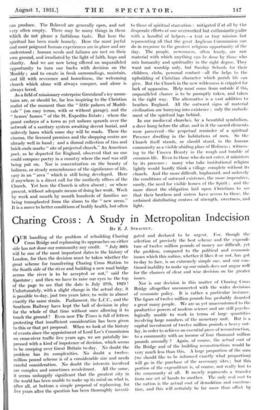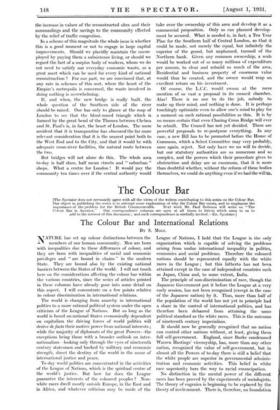Charing Cross : A Study in Metropolitan Indecision By E.
J. STRACHEY.
OUR handling of the problem of rebuilding Charing Cross Bridge and replanning its approaches on either side has not done our community any credit. " July 30th Will be one of the most important dates in the history of London, for then the decision must be taken whether the great scheme for transferring Charing Cross Station to the South side of the river and building a new road bridge across the river is to be accepted or not," said the Spectator ; and then we have to raise our eyes to the top of the page to see that the date is July 27th, 1929 ! Unfortunately, with a slight change in the actual day, it is possible to-day, just two years later, to write in almost exactly the same strain. Parliament, the L.C.C., and the Southern Railway have kept the ball of decision in play for the whole of that time without once allowing it to touch the ground ! Even now The Times is full of letters protesting that insufficient consideratiOn has been given to this or that pet proposal. When we look at the history of events since the appointment of Lord Lee's Commission on cross-river traffic five years ago, we are painfully im- pressed with a kind of impotence of decision, which seems to be creeping over Great Britain to-day. No doubt the problem has its complexities. No doubt a twelve- million pound scheme is of a considerable size and needs careful consideration. No doubt the interests involved are complex and sometimes recalcitrant. All the same, it seems unhappily significant that the greatest city in the world hits been unable to make up its mind on what is, After all, at bottcim a simple proposal of replanning, for Ave years after the question has been thoroughly investi- gated and declared to be urgent. For, though the selection of precisely the best scheme and the expendi- ture of twelve million pounds of money are difficult, yet the problem, compared to the political and economic issues which this nation, whether it likes it or not, has got to-day to face, is an extremely simple one, and our con- tinued inability to make up our minds does not augur welt for the chances of clear and wise decision on far greater issues.
Nor is our decision in this matter of Charing Cross Bridge altogether unconnected with the wider decisions of economic policy. It is rather a particular instance. The figure of twelve million pounds has probably daunted a great many people. We are as yet unaccustomed to the productive powers of modern science and are still psycho- logically unable to work in terms of large quantities involving large numbers of the monetary unit. But is a capital investment of twelve million pounds a heavy out- lay, in order to achieve an essential piece of reconstruction, to a community with an income of four thousand million pounds annually ? Again, of course. the actual cost of the Bridge and of the building reconstructions would be very much less than this. A large proportion of the sum (we should like to be informed exactly what proportion) will go in the purchase of the necessary sites ; but this portion of the expenditure is, of course, not really lost to the community at all. It merely represents a transfer from one set of hands to another. The only real cost to the nation is the actual cost of demolition and construc- tion, and this will certainly be far more than offset by the increase in values of thereconstructed .sites and their surroundings and the savings to the community effected by the relief of traffic congestion.
In a scheme of this magnitude the whole issue is whether this is a good moment or not to engage in large capital improvements. Should we placidly maintain the unem- ployed by paying them a subsistence living, or should we regard the fact of a surplus body of workers, whom we do not need to satisfy our everyday economic wants, as a great asset which can be used for every kind of national reconstruction ? For our part, we are convinced that, at any rate in schemes of this sort, where the heart of the Empire's metropolis is concerned, the waste involved in doing nothing is overwhelming.
If, and when, the new bridge is really built, the whole question of the Southern side of the river should be raised. One has only to glance at the map of London to see that the blunt-nosed triangle which is formed by the great bend of the Thames between Chelsea and St. Paul's is, in fact, the heart of London. The mere accident that it is transpontine has obscured the far more relevant consideration that it is the nearest point both to the West End and to the City, and that it would be with adequate cross-river facilities, the natural route between the two.
But bridges will not alone do this. The whole area to-day is half slum, half mean streets and " suburban " shops. What a centre for London ! It would pay the community ten times over if the central authority would take over the ownership of this area and develop it as a commercial proposition. Only so can planned develop- ment be secured. What is needed is, in fact, a Ten Year Plan for the Southern half of Central London, so that it could be made, not merely the equal, but infinitely the superior of the grand, but unplanned, turmoil of the Northern bank. Given any common ownership, a scale would be worked out of so many millions of expenditure per annum, to clear and rebuild so much of the area. Residential and business property of enormous value would thus be created, and the owner would 'reap an excellent return on his investment.
Of course, the L.C.C. would swoon at the mere mention of so vast a proposal in its council chamber. Alas ! There is no one to do the job, nobody to make up their mind, and nothing is done. It is perhaps touchingly optimistic even to allow one's mind to play for a moment on such rational possibilities as this. It is by no means certain that even Charing Cross Bridge will ever be rebuilt. The Council has not yet decided. There are powerful proposals to re-postpone everything. In any case, a new Bill has to be promoted before the House of Commons, which a Select Committee may very probably, once again, reject. Not only have we no will to decide, but our statutory authorities are so numerous and so complex, and the powers which their procedure gives to obstruction and delay are so enormous, that it is more than doubtful whether, without the reform of these bodies themselves, we could do anything even if we had the will to,



































 Previous page
Previous page